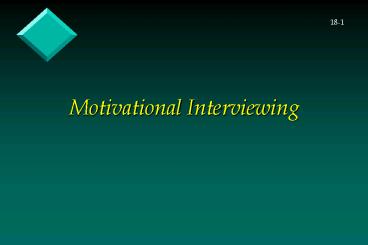Motivational Interviewing - PowerPoint PPT Presentation
1 / 14
Title:
Motivational Interviewing
Description:
18-1. Motivational Interviewing. 18-2. Objectives. Participants will: ... and referral to specialized treatment using motivational interviewing techniques ... – PowerPoint PPT presentation
Number of Views:101
Avg rating:3.0/5.0
Title: Motivational Interviewing
1
Motivational Interviewing
2
Objectives
- Participants will
- increase their skills to provide advice and
referral to specialized treatment using
motivational interviewing techniques
3
Five Principles
- Express empathy
- Develop discrepancy
- Avoid argument
- Roll with resistance
- Support self-efficacy
4
Stages of Change
5
Prochaska DiClemente Stages of Readiness to
Change
18-5
Stage Description Counseling
Objectives Pre-contemplation Not considering
change u Identify patients goals
u Provide
information
u Bolster self-efficacy Contemplation Ambival
ent about change u Develop discrepancy between
goal behavior
u Elicit self-motivational statements Determi
nation Cognitively committed to u Strengthen
commitment to change change
u Plan strategies for
change Action Involved in
change u Identify and manage new
barriers u
Recognize relapse or impending relapse Maintenanc
e Behavior change is stable u Assure
stability of change
u Foster personal development Relapse
Undesired behaviors occur u Identify
relapse u
Reestablish self-efficacy and commitment
u Develop new
behavioral strategies Termination Change
is very stable u Assure stability of change
6
Stage 1 Pre-Contemplation(Patient not ready for
change)
- Barrier - Lack of information
- Assess patients understanding
- Assess patients receptivity to new information
- Deliver information
- Assess patients reaction
7
Stage 1 Pre-Contemplation(Patient not ready for
change)
- Barrier - Low self-efficacy
- Explore origins of low self-efficacy
- Assess for reasons for relapse
- Assess for personal strengths
- Treat or refer any underlying psychiatric
disorder or family dysfunction
8
Stage 1 Pre-Contemplation(Patient not ready for
change)
- Barrier - Contentment with the present
- Solicit patients views on beneficial aspects of
the behavior - Ask patient about less beneficial aspects of the
behavior - Explore patients goals
- Discuss compatibility between behavior and goals
9
Stage 2 Contemplation(Patient thinking about
change)
- Express empathy
- Develop discrepancy
- Avoid argumentation
- Roll with resistance
- Support self-efficacy
10
Stage 3 Determination(Patient made decision to
change)
- Strengthen commitment to change
- Plan strategies for change
- Make statements of partnership
- Arrange follow-up
11
Stage 4 Action(Patient involved in change)
- Review effectiveness of previous strategies for
change - Positive strategies
- Improvements for strategies
- New or future challenges
- Dealing with current and future challenges
- Statements of partnership
- Arrange follow-up
12
Stage 5 Maintenance(Patient has made changes)
- Ensure stability of change
- Identify goals for personal development
- Plan for progressing toward personal goals
13
Stage 6 Relapse(Patient has relapsed)
- Reinforce normalcy of relapse
- Bolster self-efficacy
- Identify reason(s) for relapse
- Re-frame relapse as learning experience
- Restage the patient
14
Stage 7 Termination
- Assure stability of change































![get [PDF] DOWNLOAD Motivational Interviewing in Nutrition an PowerPoint PPT Presentation](https://s3.amazonaws.com/images.powershow.com/10084661.th0.jpg?_=20240724077)